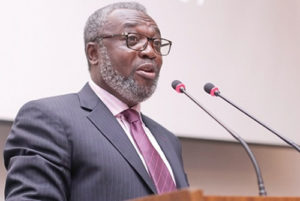Measles are rare in Ghana – GHS

Dr Anthony Nsiah Asare, the Director General of the Ghana Health Service (GHS), said they have not recorded cases of Measles in the country since 2003.
He said measles had become rare care medical cases to be learnt by new doctors when they were on practicals and attributed the success to immunisation, which the GHS had taken seriously over the years in the bid to eliminate neo-natal tetanus.
Dr Asare, who was speaking at the launch of a leadership training for immunisation supply chain managers in Accra, said the new doctors unlike the older ones would even find it difficult to identify the symptoms of Measles because cases were not being recorded.
The launch was organised by Global Alliance for Vaccine and Immunisation (GAVI) in partnership with United Parcel Services (UPS) to provide healthcare personnel with soft skill, leadership skills and competencies engrained in private sector to enable them to effectively fulfil their roles.
He said the goal was to improve participants’ general skills in people management, communication, project management, problem solving and personal/professional development and provide specific people management skills instructions.
It is also expected to specifically focus on critical leadership skills, within a realistic supply chain management context and opportunities for practice and network with peers as well as offer insights and best practices from the private sector.
The Director General said the Ghana Health Service had not achieved the success only in the area Measles, but Polio meningitis and Meningitis, saying, Ghana had also not recorded Polio and Meningitis since 2008 and 2012, respectively.
Dr Asare said there had been a significant reduction in Pneumonia, Diarrhea and the reduction of under-five mortality, adding that in spite of the robust reduction, chalking the 100 percent success was tough.
He said Vaccines in general were encouraging healthy lives for all worldwide.
The Director General said the institute was putting up measures and efforts until all vaccine related illnesses were eradicated.
“We want to touch every child everywhere in Ghana to achieve this,” he noted.
He announced that on April 24, GHS would launch the biggest medical drone distribution centre in Ghana.
“Together with government, we’ll make sure that we use the drones to deliver the vaccines to the underserved and also very hard to reach areas in small quantities so that they don’t get expired. They will also get the right quantities at the right time,” he added.
Mr Magloire Achidi, Supply Chain Consultant of GAVI admitted that Ghana’s health system was one of the richest health systems in the region, adding that from the last statistics mentioned, the GDP coverage according to the WHO/UNICEF estimate was up to 99 percent.
“This is by far the coverage of many countries in Europe and America so that demonstrates the willingness, enthusiasm and professionalism of you people who are doing that and supporting this course,” he noted.
Source: GNA
